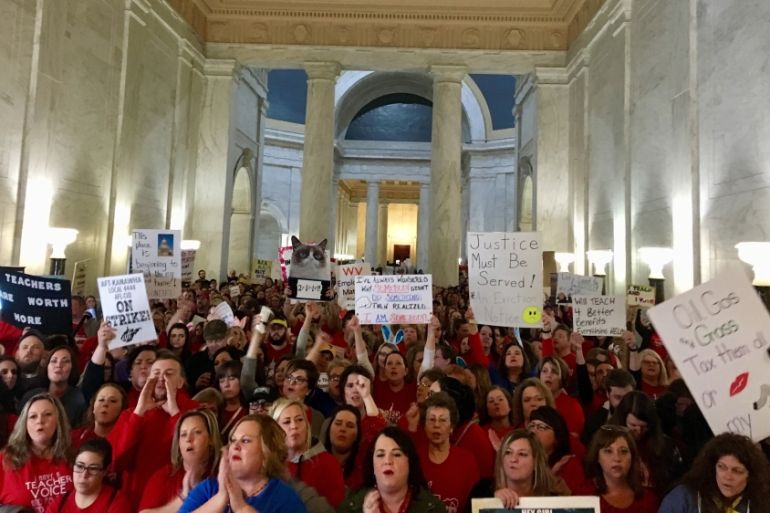West Virginia teachers walk out, shutting down all public schools
Strike over low wages and cuts to benefits will continue on Monday as teachers demand US state takes action.

From the first minute Ellen Shepherd – a kindergarten-to-5th-grade special education teacher – picketed Thursday morning, along with other school employees in Elkins, West Virginia, community members showed their support.
“It was amazing,” said Shepherd, who is also the president of the Randolph County Education Association. “People were stopping to offer support, coffee, doughnuts, stuff all day long,” she added.
Keep reading
list of 4 itemsTop USC graduate cancelled over Gaza speaks out
Columbia president faces anti-Semitism Congress hearing: What’s at stake?
Muslim pupil loses UK court bid over Michaela school prayer rituals ban
“Most importantly, those who weren’t sure about was going on stopped and asked us, so we were able to explain why we are here, what we are doing, and what got us to this point.”
After months of writing legislators, attending hearings, and holding educational pickets before and after school, the three teachers’ unions representing educators across the US state of West Virginia announced a collective walkout for Thursday and Friday, forcing all public schools to close.
On Friday afternoon, the unions announced the strike will continue on Monday.
The teachers are demanding higher wages and better benefits as they struggle to afford rising healthcare costs.
On both Thursday and Friday, thousands sang and chanted at the state capitol building in Charleston, calling for an agreement before the end of the legislative session on March 10.
According to local media, teachers in the state set up food banks to ensure students who depend on school meals were fed during the strike.
Struggling to fill positions
While the American Federation of Teachers-West Virginia, West Virginia School Service Personnel Association, and West Virginia Education Association have historically competed for members and influence, they unified in the face of reduced healthcare coverage and doubling insurance premiums, copays and deductibles.
Cuts to benefits forced Mary Stiles, a high school teacher in Morgantown, to stop taking a medication that was no longer covered by the mandatory Public Employees Insurance Agency plan required for all government employees.
![Thousands of teachers showed up in Charleston, West Virginia to protest against low pay and lack of benefits [ John Raby/ AP Photo]](/wp-content/uploads/2018/02/c4f28e2fe98a43caa14be58a1e68645b_18.jpeg)
Critics in the government and local communities, Stiles said, “are trying to make it look like we’re being greedy, that we want this big raise”.
“But, we want our medical insurance to be fully funded and we want good coverage,” she told Al Jazeera, not just for educators, but for all public employees.
Organisers have said that salaries are so low, that many have had to take second jobs to support their families
As salaries and benefits have declined, so have teaching incentives, and the number of vacancies has risen to more than 700.
There are nearly 20,000 teachers employed by the state.
Shepherd told Al Jazeera: “We cannot fill kindergarten positions, music positions … English, special ed, social studies: positions that were a given in the past.”
![Teachers risk fines by continuing the walkout [John Raby/AP Photo]](/wp-content/uploads/2018/02/e73c5b648fd04073afe85343d900a5e7_18.jpeg)
West Virginia Governor Jim Justice signed legislation this week that gives teachers a two percent pay increase in July. It will be followed by a one percent increase over the next two years. The bill, however, reduces the increase that had been previously proposed.
West Virginia’s public school employees are also concerned about legalising taxpayer-funded private school vouchers and increasing the number of charter schools, policies which have been at the core of US Education Secretary Betsy DeVos’s policy platform.
‘A risk worth taking’
Though teachers have not gone on strike since 1990, teachers’ unions in West Virginia rank 13th in the United States, according to a 2012 study which found that they were formidable and thoroughly engaged state politics and in developing policies.
Viewed as the birthplace of the US labour movement, West Virginia has a long history of strong unions that organised workers such as coal miners, craftsmen, and nurses to collectively bargain for improved wages, working conditions, and healthcare.
However, it is illegal under West Virginia law for public employees to go on strike, and teachers risk fines or imprisonment by continuing the walkout.
At a meeting to discuss legal ramifications, Shepherd told Al Jazeera that the response of the 300 assembled educators was unanimous: “Our kids are more important.”
Shepherd added: “So, yes, we face that risk, but that’s a risk that’s worth taking because our kids and their education is so valuable to us.”
![Potential next steps for the unions include returning to work for a few days before resuming the stoppage, having rolling walkouts by county, or continuing the statewide strike until changes are made [John Raby/ AP Photo]](/wp-content/uploads/2018/02/d2c46d5c76774ae98066058078e81c62_18.jpeg)
In a statement released on February 20, West Virginia Superintendent of Schools Steven Paine noted the illegality of work stoppages by public employees and encouraged “educators to advocate for the benefits they deserve, but to seek courses of action that have the least possible disruption for our students”.
While educators hope that an agreement will be reached quickly, the unions are taking it day by day.
“Let’s call a spade a spade: It’s a strike,” said Josh Nelson, who has been teaching high school Spanish and English in Huntington for three years. “We don’t know when this will end.”
Potential next steps for the unions include returning to work for a few days before resuming the stoppage, having rolling walkouts by county, or continuing the statewide strike until changes are made.
“West Virginia teachers have been terribly, terribly slighted for a long time,” said Cindy Stemple, a retired teacher and union member who worked for public schools in West Virginia for 35 years.
“People are fed up with it, they’ve had enough,” she added.